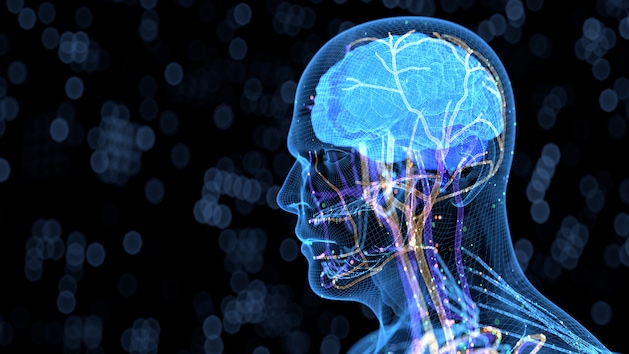A protein hormone called “Klotho” could counteract mental decline in old age, a test with rhesus monkeys suggests. A single injection of this protein under the skin was enough to significantly improve the aging primates’ memory performance for more than two weeks. This result confirms previous studies with mice and opens up the possibility that this “fountain of youth” protein also works in humans, as the researchers report in “Nature Aging”.
Even without neurodegenerative diseases such as Alzheimer’s or Parkinson’s, mental performance and memory decline with age. This loss can be counteracted through brain training, a healthy lifestyle and an active social life. But it cannot be prevented completely. The complexity of both the aging processes and our thinking organs make it difficult for scientists to find effective and concrete approaches for effective pharmacological countermeasures or therapies.
But in recent years, the so-called Klotho protein has become the focus of aging research. This endogenous protein sits in the cell membrane of various organs, but is also released into the blood as a hormone. It influences, among other things
It is still produced in abundance in newborns and small children, but its levels then decrease continuously over the course of life.
The interesting thing, however, is that although this protein hormone cannot cross the blood-brain barrier, it also appears to influence the brain and mental performance: “Studies show that people with elevated Klotho levels for genetic or other reasons improve as they age mental performance, delayed neuropathological symptoms and a lower risk of senile dementia and Alzheimer’s,” report Stacy Castner from Yale University in New Haven and her colleagues.
Tests with mice have also shown that administering the Klotho protein via injection also has a mentally rejuvenating effect: the old animals showed better mental performance, increased synaptic plasticity and a reduced risk of Alzheimer’s and other dementias.
Could this “fountain of youth” protein also help against mental decline in humans? To find out, Castner and her team first examined this in rhesus monkeys. “Rhesus macaques are 93 percent phylogenetically similar to us humans, so they have similar genetic diversity and demonstrate higher cognitive functions,” explains the team. “Like humans, rhesus monkeys experience mental decline and synaptic changes in various brain regions as they age, including the hippocampus and prefrontal cortex.”
For their study, the researchers administered a single dose of ten micrograms of protein per kilogram of body weight to 18 older rhesus monkeys, injected under the skin. Beforehand and at regular intervals afterwards, they had the rhesus monkeys complete memory tests. The monkeys had to remember which of up to nine similar-looking containers a piece of food had been placed in. These tests were carried out at different levels of difficulty.
The result: The first effects were seen in the senior rhesus monkeys just four hours after the Klotho injection. Monkeys performed significantly better in the memory tests than before. However, this was not the case in control animals that only received a saline solution. The positive effect on the rhesus monkeys’ memory lasted for at least two weeks. This was particularly evident in the tasks that placed greater demands on the brains of aging animals.
“Together, our data demonstrate that the administration of Klotho can improve the mental performance of aging rhesus monkeys,” write Castern and her colleagues. This effect lasts well beyond the half-life of the protein in the blood. This could indicate that this protein causes longer-lasting changes in brain metabolism and other functions important for cognitive performance.
According to Castern and her team, these results suggest that humans could also benefit from treatment with the Klotho protein. It seems particularly promising to restore the level of this hormone in the blood that is natural for childhood. Additional tests with a higher dose of 20 and 30 micrograms of Klotho per kilogram of body weight did not produce any improvements compared to the lower dosage.
“A systemic, low-dose Klotho treatment could prove to be therapeutically effective in aging people,” say the researchers. Before this happens, however, further questions must be clarified, they emphasize. It is still unclear which “messengers” the Klotho protein uses to influence brain functions, because it does not penetrate into the brain itself. It should also be investigated whether even lower concentrations of this protein may be effective and how long the maximum effect lasts.
Von Nadja Podbregar
The original for this article ““Fountain of Youth Protein” rejuvenates aging memory” comes from scinexx.















